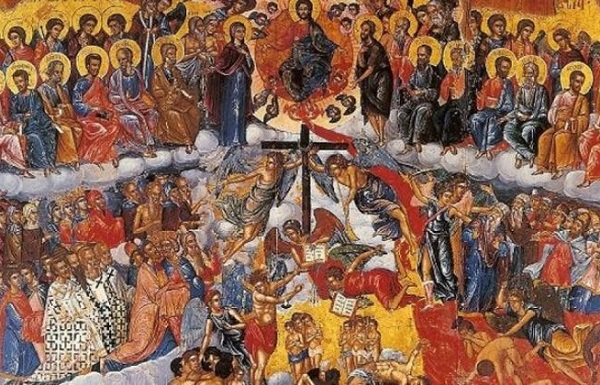Sunday of the Last Judgement
19 February 202313th February 1972
In the name of the Father, the Son and the Holy Ghost.
Today, on our preparation journey towards Lent, we have come to an ultimate stage: we are confronted with judgement. If we pay attention to it, next week our spiritual destiny will be in our own hands, because next week is the day of Forgiveness.
The link between these two days is too obvious. If we only could become aware that all and each of us stand before the judgement of God and the judgement of men, if we could remember and realise with depth, wholeheartedly, in earnest that we are, all of us, indebted to each other, all responsible to each other for some of the pain and the heaviness of life, then we would find it easy, when we are asked to forgive, not only to forgive, but, in response to this request, to ask for forgiveness ourselves.

It is not only by what we do, not only in a way by what we leave undone, it is by this extraordinary lack of awareness, of our responsibility, of all we could be to others, and to do to others, that we do not fulfil our human vocation. We could, and we should, on all levels and for all men, and beyond men for the whole world which is ours, be a blessing and a revelation of things great, of things so great, so deep that people, we first of all, could realise that we are on the scale of God Himself, that our vocation is not only to be morally good, but to be as great as God. A mystic of Germany said in one of his poems ‘I am as great as God, God is as small as I.’
If we only could remember this, and this is why the judgement is not only a moment when we are confronted with a danger of condemnation; there is in the very notion of judgement something great and inspiring. We are not going to be judged according to human standards of behaviour of decency. We are going to be judged according to standards which are beyond human ordinary life. We are going to be judged on the scale of God, and the scale of God is love: not love felt, not an emotional love, but love lived and accomplished. The fact that we are going to be judged, that indeed we are being judged all the time, above our means, beyond all our smallness must, should reveal to us our potential greatness. And the parable which we have read today can be seen in those very terms: men are judged by Christ, in His parable, on humanity. Have these men been human or not? Have they known how to love in their hearts first, but also in action, in their very deeds because, as Saint John puts it, one who says that he loves God and does not love his neighbour actively, creatively is a liar. There is no love of God if it is not expressed in every detail of our relationship with men, with people and with each person.
And so, let us this week prepare ourselves for the final stage of our journey by asking ourselves in the face of this divine judgement, ‘Am I human? Am I human within myself, in my behaviour – not my general attitude, but my ways: are they human? Is my life an expression of a fine, a thoughtful, a perceptive, a creative, and at times a generous and a sacrificial love?’ As the object of love is the test of this love, it must be my neighbour; to love God who asks for nothing is too easy.
And if in the course of this week we find where we belong, we find both our shortcomings and the greatness of our vocation; if we make our peace with those to whom we are indebted, then, when the time comes to forgive, when someone else will have made the same discovery, we will be able with joy to give peace and forgiveness out of a sense of responsibility and of the creative joy of repentance. Amen.






